Lian Yu: TryHackMe Writeup
Try Hack Me - Lian_Yu Link to heading
A beginner level security challenge
Objectives Link to heading
- Deploy the VM and Start the Enumeration.
- What is the Web Directory you found?
- What is the file name you found?
- What is the FTP Password?
- What is the file name with SSH password?
- user.txt
- root.txt
Recon, Scanning, and Enumeration Link to heading
Once the VM has been launched I am going to start scanning the box.
Command: nmap -T4 -sC -sV -oN nmap\scan.txt <ipaddress>
Command Breakdown:
-T4: speed of nmap scan is 4/5 (personal preference of mine)
-sC: Scan with default NSE scripts. Considered useful for discovery and safe
-sV: Attempts to determine the version of the service running on port
-oN: Normal output to the file normal.file
NMAP Results:
Host is up (0.12s latency).
Not shown: 996 closed ports
PORT STATE SERVICE VERSION
21/tcp open ftp vsftpd 3.0.2
22/tcp open ssh OpenSSH 6.7p1 Debian 5+deb8u8 (protocol 2.0)
| ssh-hostkey:
| 1024 56:50:bd:11:ef:d4:ac:56:32:c3:ee:73:3e:de:87:f4 (DSA)
| 2048 39:6f:3a:9c:b6:2d:ad:0c:d8:6d:be:77:13:07:25:d6 (RSA)
| 256 a6:69:96:d7:6d:61:27:96:7e:bb:9f:83:60:1b:52:12 (ECDSA)
|_ 256 3f:43:76:75:a8:5a:a6:cd:33:b0:66:42:04:91:fe:a0 (ED25519)
80/tcp open http Apache httpd
|_http-server-header: Apache
|_http-title: Purgatory
111/tcp open rpcbind 2-4 (RPC #100000)
| rpcinfo:
| program version port/proto service
| 100000 2,3,4 111/tcp rpcbind
| 100000 2,3,4 111/udp rpcbind
| 100000 3,4 111/tcp6 rpcbind
| 100000 3,4 111/udp6 rpcbind
| 100024 1 38570/tcp6 status
| 100024 1 42067/tcp status
| 100024 1 53744/udp status
|_ 100024 1 59897/udp6 status
Service Info: OSs: Unix, Linux; CPE: cpe:/o:linux:linux_kernel
Based on our NMAP results we are able to see that thereis a web service that is open. So lets the IP address of our box and put it into our browswer and see what comes up.

The homepage that we are precented with gives us a little back store on who Oliver Queen but that is about it.
So lets check out the source code of this page and see if we are able to find any additional clues.
Their doesn’s seem to be anything usefull on this page.
How about we fire up GoBuster and see if there is anything creeping below the surface of this site.
Command: gobuster dir -u http://<ip> -t 40 -w /usr/share/dirbuster/wordlists/directory-list-2.3-medium.txt
Command Breakdown:
dir: Specify that you want to search for dictories.
-u: Full URL (including scheme), or base domain name.
-t: Declare the amount of threds you want to use.
-w: Path to the wordlist used for brute forcing (use – for stdin).
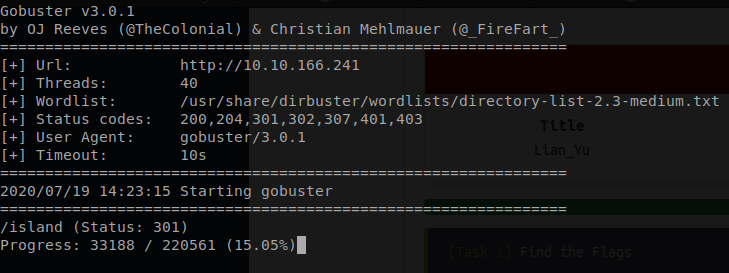

island urls is accessible by our browser and it seem that they where not expecting us.
It seems that our next hit is to got to Lian_Yu and we are going to need a code word in order to get in. Let’s check out the source code to see it we can find this code word.
I think that we have found our code word and it looks like the tried to hit it plan site. Cleaver!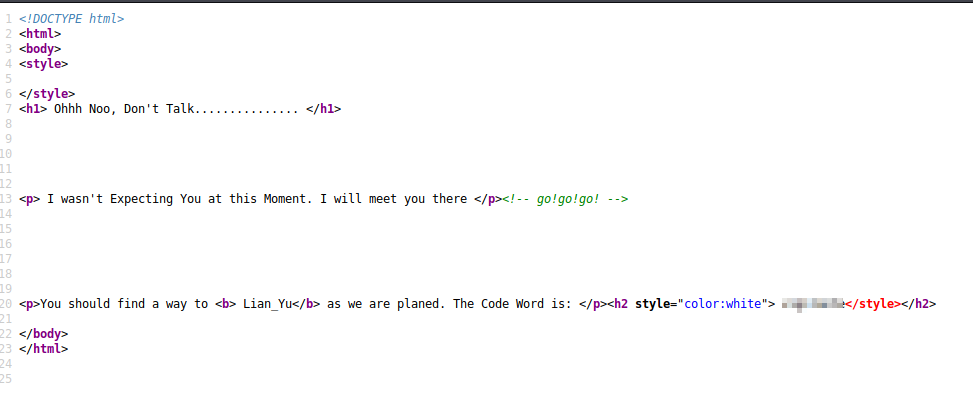
Let’s take a look at the hit that TryHackMe gives us.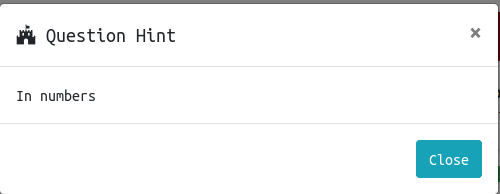
Our hit is “In numbers”. After digging around on the internet a bit I was able to find the SecLists repo maintained by Daniel Miessler, Jason Haddix, and g0tmi1k.
So I quickly did a git clone of the repository and decided to use one of the Fuzzing word list in combnation with GoBuster.
Command: gobuster dir -u http://<ip>/island -t 40 -w /usr/share/dirbuster/wordlists/SecLists/Fuzzing/4-digits-0000-9999.txt

Now we are going to navgate to that site and see if we can find the next clue.
It would seem that the only thing that we have on this site is just a YouTube clip explaning more about Oliver Queen.


So I went back to our dear friend GoBuster and had it checked for .ticket extentions.
Command: gobuster dir -u http://<ip>/island/2100 -T 40 -w /usr/share/dirbuster/wordlists/directory-list-2.3-medium.txt -x .ticket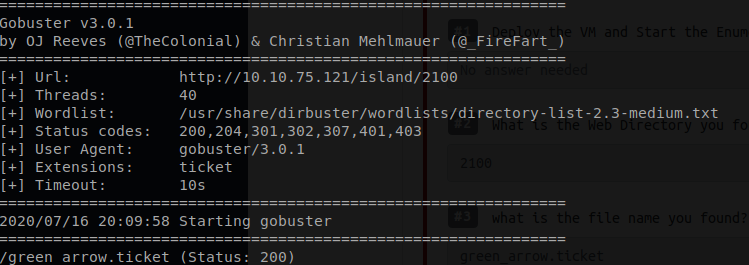
When we go to open up the `green_arrow.ticket` in our browser we are given what looks like it could be an encoded password.
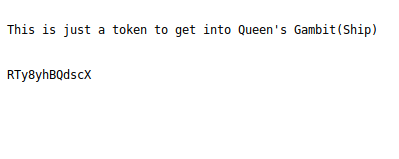
The only one that I was able to any readiable results from was `Base58`. It is possible that we now have a username and password combonation.. but to what it the exact question.
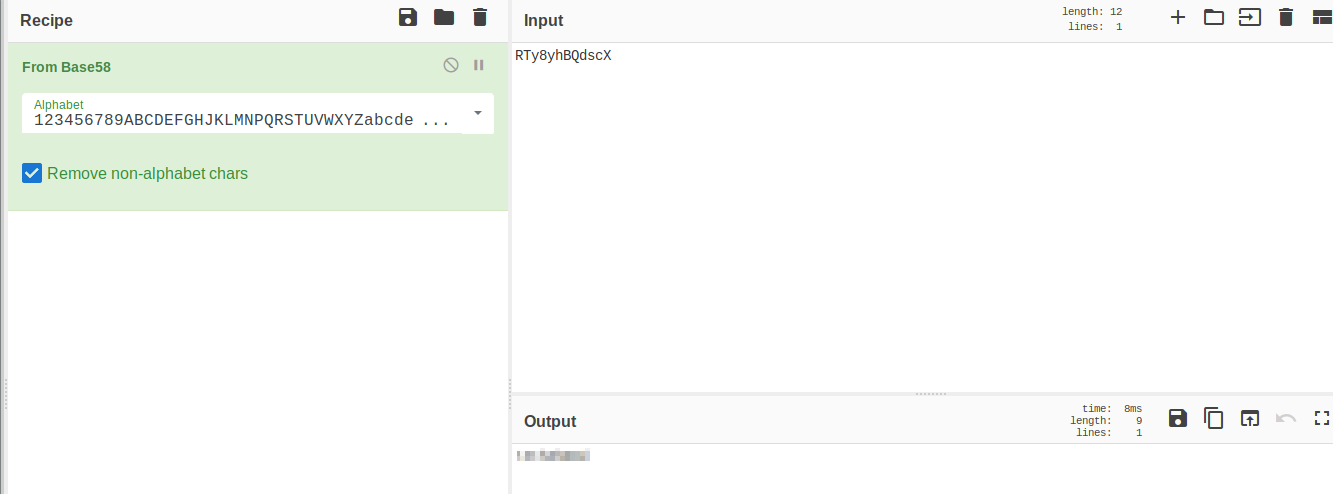
If we look back at our nmap scans that when did at the begining of this challene, remember that we had both an FTP and an SSH port open.
Port 21 our FTP port
Port 22 is our SSH port
Compromise Link to heading
So we are going to use that username and password that we found and try to log into each port with them. Starting with the FTP.
Command: ftp <ip address>
Looks like we are able to log into FTP with the credentials that we found earlier.
Now if we use our ls command we will be able to see if there is anything that it being stored around here.
Seems like we have a couplet of images that are just laying around. Let’s go ahead and copy them ot our local computer so can check them out later.
Command: mget *.*
No that our images are downloaded lets see if their is anything use around.
Let’s go up a directory using the cd .. commade.
It seem that there are more users on this server then just the one that we had found.
I tried to change into that directory but was unsuccessful, so we will return to it later.
We are now going to take a look at the images that we downloaded while logged into the FTP server.
The first image that we are going to look into is Leave_me_alone.png.
When we use the command of file Leave_me_alone.png you can see that the results come back and say that the file type is data and not png.
This leads me to believe that there could be something wrong with this file.
We can use hexeditor to view the header information of out image and see if it is correct.
Here is a nice cheat sheet that breaks down what the header should be for an png image.
If you compare the header of the image to the cheet sheet you can see that the header for this png file is not correct.
So we are going to changed it to 89 50 4E 47, save the changes and then try and open the image.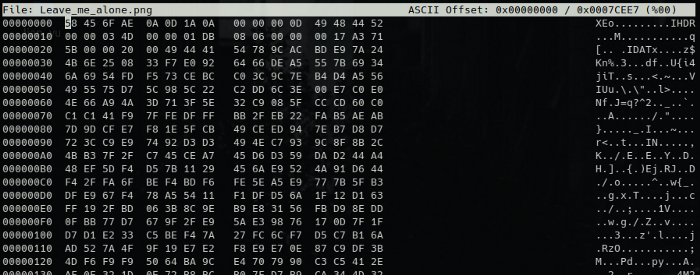
Leave_me_alone.png image you will need that it actually opens up this time around.

Command: steghide info aa.jpg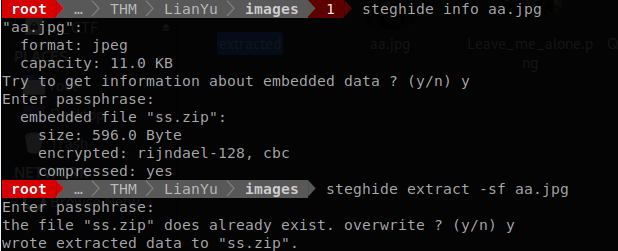
Command: unzip ss.zip
It looks like two files where extracted. Lets cat out the content of each file and see what awaits us.
This time we are going to take a look at our next file.
It seems that the content of this file could be yet another password.
So we have a password but what it the username to go along with it an most importantly do we need to log into.

There is only one other port avaiable that we could try and log into this time around. We are going to try and log into our SSH port this time.
Command: ssh <username>@<ipaddress>
At this moment in the challenge it helps if you know anything about the TV show Arrow. I was able to pull on my knowlege of the show and figure out the username for SSH by a litte bit of luck and some well placed hints.
The first hint would be the name of the other directory that we saw when logged into under the FTP account.
Our second hing would have been the image that we had to correct the header on.
So I toke the name of that character and used it in our SSH command and combined it with the content of the shado file and then … BOOM!!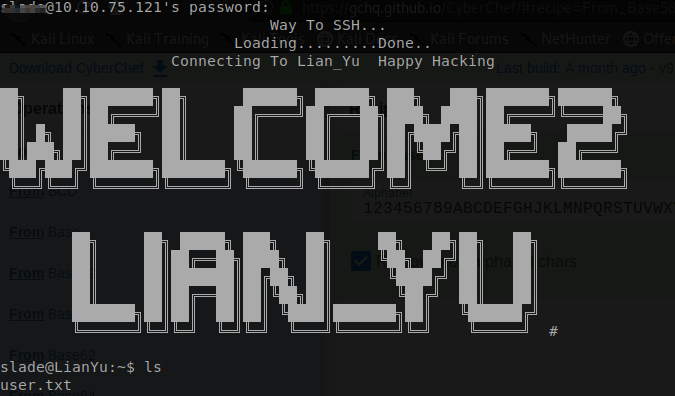
ls command and I was given out user.txt file and then I used the cat command to receive the content of that file as well.
Just like that we were able to find our user flag.
Privilege escalation Link to heading
Now that we have found our user flag the next thing that we will need to do is try and find a to escalation our privileges from the slade user to a root user.
Lets see what we are able to run on this box that does not require the root password.
Command: Sudo -l
pkexec file without being prompted for a root password.
While researching possible ways to exploite pkexec I came across an article here and it gave an an idea to see if I could call a bash shell from pkexec.
Command: sudo /usr/bin/pkexec /bin/bash
I was able to successfully gain a root shell and now we need to find out root.txt file.
So lets poke around in our root directory and see if we are able to find it.
Using our ls /root command we are able to find the root.txt file.
Now we will need to receive the content of that file.